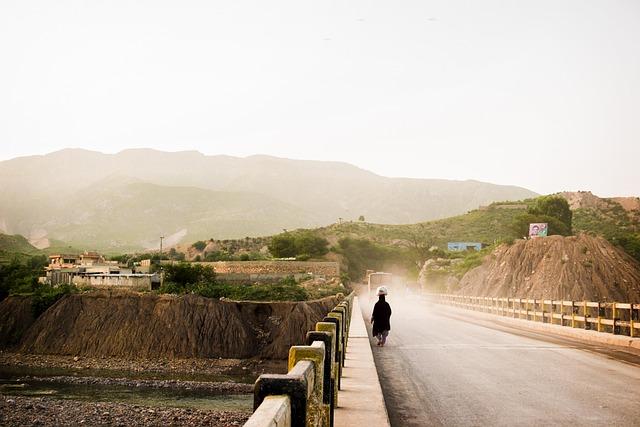Navigating Challenges: Pakistan’s Public Policy Landscape
In the heart of South Asia, Pakistan stands at a crossroads, where rich cultural heritage and modern aspirations converge amid a landscape of complex public policy challenges. From economic instability to social inequality, the nation grapples with a myriad of pressing issues that require innovative solutions and strategic foresight. This article delves into the intricate fabric of Pakistan’s public policy landscape, exploring the nuanced interplay of governance, societal needs, and international dynamics. As policymakers strive to chart a course through turbulent waters, we examine the multi-faceted challenges they face and the potential pathways to a more resilient future. Join us on this journey to understand the forces shaping public policy in Pakistan, and discover how these challenges can be reframed as opportunities for transformation and growth.
Shaping the Future: Analyzing Key Challenges in Pakistans Public Policy Framework
Pakistan’s public policy framework stands at a crucial crossroads, where societal needs collide with bureaucratic realities. The inherent complexity of governance demands a concerted effort to address several key challenges that impede effective policy implementation. These challenges include:
- Fragmentation of Policy Framework: Often, policy measures are disjointed and lack coherence, leading to inefficiencies and overlaps.
- Resource Constraints: Limited financial and human resources hinder the ability of agencies to execute policies effectively.
- Lack of Public Participation: Citizens’ voices are frequently absent in the policy-making process, resulting in initiatives that may not align with public needs.
- Corruption and Mismanagement: Systemic corruption undermines trust in governmental institutions and diverts resources away from intended policies.
To navigate these challenges, a structured approach is necessary. Creating an integrated policy evaluation framework can help in assessing the impact of various initiatives on societal welfare. A potential model could involve:
| Aspect | Importance |
|---|---|
| Stakeholder Engagement | Enhances legitimacy and acceptance of policies. |
| Data-Driven Decision Making | Promotes transparency and accountability. |
| Capacity Building | Empowers agencies to implement policies effectively. |
Such focused strategies not only facilitate the formulation of responsive policies but also ensure that they are sustainable in the long term, ultimately contributing to Pakistan’s growth and development. Addressing these fundamental issues could pave the way for a more robust and effective public policy landscape.

Bridging the Gap: Enhancing Stakeholder Engagement in Policy Development
To effectively navigate the complexities of public policy development in Pakistan, enhancing stakeholder engagement is crucial. By fostering an inclusive dialogue among various groups, the policymaking process can reflect the diverse needs and aspirations of the population. Key strategies to achieve this engagement include:
- Collaborative Workshops: Bringing together government officials, community leaders, and citizens to brainstorm and discuss policy issues.
- Feedback Mechanisms: Establishing platforms for citizens to provide input on proposed policies through surveys or public forums.
- Educational Campaigns: Raising awareness about the policymaking process and encouraging participation among marginalized communities.
Moreover, leveraging technology can significantly enhance transparency and accessibility in the public policy arena. Engaging citizens through digital platforms not only facilitates real-time communication but also encourages broader participation. For instance, social media can serve as an effective tool for sharing policy drafts and soliciting public opinion. A potential roadmap for effective stakeholder engagement might include:
| Engagement Activity | Description | Expected Outcome |
|---|---|---|
| Public Hearings | Open forums for discussion on specific legislative proposals. | Enhanced public input and accountability. |
| Online Polls | Digital surveys to gauge public opinion on key issues. | Data-driven insights for policymakers. |
| Stakeholder Partnerships | Collaboration with NGOs and local organizations. | Broadened outreach and impact. |

Tackling Socioeconomic Disparities: Tailored Approaches for Inclusive Policy Solutions
The challenge of socioeconomic disparities in Pakistan requires a multifaceted approach that recognizes the unique needs of different communities. Tailoring policy solutions to fit localized contexts can lead to greater inclusivity and effectiveness. Policymakers must consider factors such as education, healthcare access, and employment opportunities to build frameworks that uplift marginalized groups. For instance, initiatives might include:
- Localized Skill Development Programs: Programs focused on equipping youth with skills relevant to their regional economies.
- Community-Based Health Initiatives: Mobilizing local resources to improve healthcare access and education, especially in rural areas.
- Microfinance Opportunities: Providing financial services tailored for small businesses to stimulate local markets.
Furthermore, collaborative governance models can enhance transparency and accountability in implementing these policies. Engaging local stakeholders in the decision-making process delegates authority and fosters a sense of ownership within communities. The gathering and dissemination of data on socioeconomic indicators is crucial, which can be organized in accessible formats such as the following:
| Indicator | Current Status | Target Status |
|---|---|---|
| Literacy Rate | 59% | 75% by 2025 |
| Poverty Rate | 24.3% | 15% by 2030 |
| Access to Clean Water | 88% | 100% by 2025 |

Harnessing Technology: Innovations to Streamline Public Policy Implementation
The integration of technology into public policy implementation is transforming the way governance operates in Pakistan. Innovations such as data analytics, geographic information systems (GIS), and digital platforms enable policymakers to make informed decisions based on real-time information. By utilizing these tools, government agencies can effectively track the flow of resources, monitor the impact of policies, and engage with citizens to gather feedback. For instance, mobile applications can facilitate communication between authorities and communities, ensuring that voices from all segments of society influence the decision-making process. This digital engagement fosters a sense of ownership among citizens and promotes transparency in governance.
Furthermore, artificial intelligence and machine learning offer policymakers unprecedented capabilities in predictive analysis and resource optimization. By analyzing historical data, governments can anticipate challenges and align their strategies accordingly. Initiatives such as smart city projects leverage IoT (Internet of Things) technology to enhance urban planning, traffic management, and service delivery. The ongoing deployment of these technological advancements not only streamlines processes but also helps in the reduction of bureaucratic delays, ultimately leading to improved public service delivery. As these innovations continue to evolve, they hold the potential to support a more responsive and efficient public policy landscape in Pakistan.
Final Thoughts
In the intricate tapestry of Pakistan’s public policy landscape, challenges weave through the fabric of governance, demanding a careful balance of innovation and tradition. As we conclude our exploration, it becomes evident that the journey is not just about overcoming obstacles but also about redefining possibilities. Policymakers, scholars, and citizens alike are called to foster dialogue and collaboration, confronting issues with both pragmatism and vision.
The path ahead may be fraught with uncertainty, but within these challenges lie untapped opportunities for growth and development. In balancing immediate needs with long-term aspirations, the nation’s narrative continues to evolve, shaped by the resilience and creativity of its people.
Ultimately, navigating the complexities of public policy is a collective endeavor—one that requires not only foresight but also a commitment to inclusive governance. As Pakistan strides forward, let’s hope for a future where policies are not just reactive but proactive, ushering in a new era of promise for all its citizens. The dialogue is far from over; it has only just begun.



